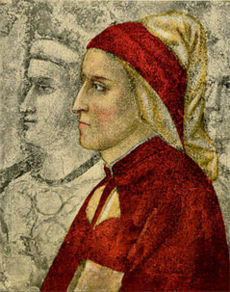In Praise of Purgatory: translator Robert Chandler writes in The Financial Times
Friday, October 1st, 2021
The supreme translator honors the supreme poet. It is the 700th anniversary of Dante Alighieri‘s death – and Robert Chandler, who has translated Vasily Grossman‘s Life and Fate and Stalingrad, among other Russian stunners, turns his attention from the Russian classics to Dante’s Italian masterpiece.

The occasion for the article is a new translation of The Purgatorio, by poet D.M. Black, published by New York Review Books with a preface by Robert Pogue Harrison, who estimates that there are more than a hundred translations of The Divine Comedy into English already. So why do we need a new one? Because The Purgatorio is special.
If Russia seems a long way from Florence, Chandler threads the connections together in his new article, “Divinity and Damnation: Why Dante Still Matters,” at The Financial Times: “Anna Akhmatova’s last public appearance was in October 1965, during a celebration of the 700th anniversary of Dante’s birth. In a moving affirmation of loyalty, she wrote in her preparatory notes that the deepest bond between her and her fellow-poets Nikolay Gumiliov and Osip Mandelstam, both killed decades earlier by the Soviets, was ‘love for Dante.’” (Mandelstam described the Divine Comedy as a perfect crystal with 14,233 facets – the number of lines in the poem.)
Readers are generally drawn to the Inferno, partly because of the set pieces like Paolo and Francesca, but also for the same reason people prefer horror films to mid-century musicals.
“Some have see Dante as a vengeful sadist, while for T. S. Eliot he was an epitome of classical restraint. Some see Dante as a mystic visionary; others see the Divine Comedy as Thomas Aquinas’s Aristotelian Catholicism put into verse,” Chandler writes. “In a recent issue of The New Yorker, Judith Thurman has described him, during his long exile from Florence, as ‘an itinerant diplomat and secretary for the lords of northern Italy’ and as an ’embittered asylum-seeker.’”
I’ll plump for The Purgatorio too. It has more movement. But Stanford’s William Mahrt would also point out that it is the only one of the three sections of the Divine Comedy that has music. There is no music in The Inferno – just noise and wails and grunts. The Paradiso leads us beyond music. But the Purgatorio rings with hymns and psalms and chant. Chandler adds: “The Purgatorio, however, is a more satisfying whole. The structure is more meaningful, the verbal music more delicate – and, above all, it is more human. In Hell and Paradise everyone is fixed in their despair or bliss; in Purgatory everyone and everything is in flux. Sinners struggle to resolve their inner conflicts. Above all, there is a sense of freshness and hope.”

Chandler concludes: “The Purgatorio is, above all, a search for meaning, and in the final cantos Beatrice enables Dante to understand that the only source of meaning is love. One of Black’s previous publications is titled Why Things Matter: The Place of Values in Science, Psychoanalysis and Religion (Routledge, 2011). Both in this translation and in his afterword Black shows us why Dante matters, and how, 700 years after his death, he can still help us to understand what may give meaning to our own lives.”
Read the whole thing here.







